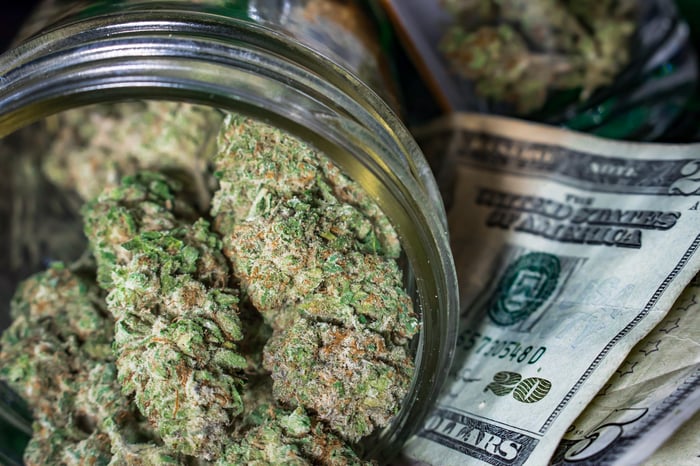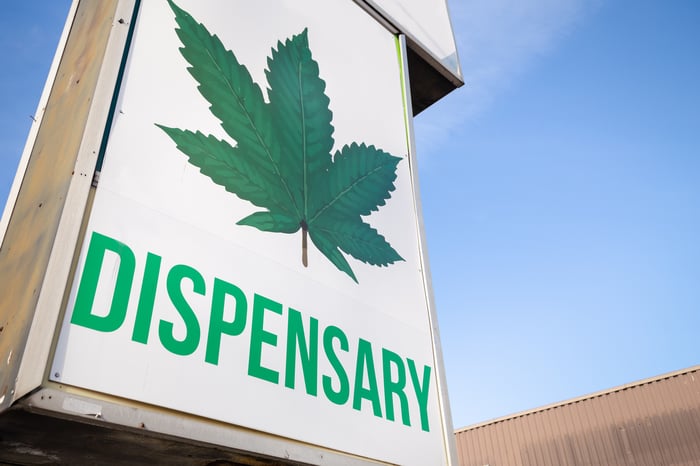Investing in the marijuana industry over the past two years has been quite the trip. Through March 2019, North American pot stocks were unstoppable. With tens of billions of dollars in black market sales occurring each year, investors appeared to be sold on the idea of these illicit sales steadily moving over to legal channels.
Yet over the past 18 months, most cannabis stocks have performed poorly. Wall Street and investors grew weary of the early stage hiccups and demanded results. Unfortunately for Canadian pot stocks, they haven't been able to deliver, with many still two or three years away from any chance at full-year profitability.
However, things are a bit different in the most lucrative marijuana market in the world: the United States. While investor skepticism remains, the regulatory bottlenecks that have thus far sunk Canada aren't present in the United States. That means some marijuana stocks are actually thriving.
The most important question is, "When can we expect U.S. marijuana stocks to be profitable?"
The answer? Sooner than you probably think.

Image source: Getty Images.
These two cannabis stocks are already raking in the green
Whereas recurring profitability is a distant hope for Canadian licensed producers, two U.S. marijuana stocks are already piling on the profits.
Multistate operator Trulieve Cannabis (TCNNF 1.20%) is the most nominally profitable pure-play marijuana stock in North America. Through the first six months of 2020, Trulieve brought in $216.8 million in net sales, generated $158.2 million in gross profit, and delivered $89.9 million in operating income, without factoring in fair-value adjustments and one-time benefits.
Trulieve's secret to success is its focus on the Florida market. This company has opened 65 dispensaries nationally, of which 63 are located in the Sunshine State, where medical marijuana is legal. By saturating Florida, Trulieve has successfully built up its brand and image without having to break the bank on advertising. As a result, it's gobbled up about half the state's medical marijuana market share.
There's also real estate investment trust Innovative Industrial Properties (IIPR -0.28%), which is the most profitable cannabis stock on a per-share basis. Wall Street's current consensus is for Innovative Industrial Properties to surpass $5 in earnings per share in 2021.
Like most REITs, Innovative Industrial Properties operates as a low-cost, highly transparent business. It acquires medical marijuana cultivation and processing assets and leases them out for long periods of time (10 to 20 years). As of the beginning of the month, IIP owned 63 properties in 16 states, with greater than 99% of its owned square footage leased for a weighted-average length of 16.2 years. As the only pot stock to pay a dividend, IIP's profitability appears secure for a long time to come.

Image source: Getty Images.
Recurring profitability is expected next year for this group of pot stocks
For the lion's share of U.S. MSOs, recurring profitability is expected in 2021. According to Wall Street's consensus estimates, the following five U.S. marijuana stocks are forecast to deliver a full-year 2021 profit:
- Green Thumb Industries (GTBIF 2.72%)
- Curaleaf Holdings (CURLF)
- Cresco Labs (CRLBF 0.76%)
- Acreage Holdings
- Planet 13 Holdings (PLNH)
There are a number of interesting names in this group. For instance, Curaleaf, Green Thumb, and Cresco Labs are, in that order, the likeliest to hit $1 billion in annual sales among North American pot stocks.
Following its acquisitions of the Select brand (via the Cura Partners buyout) and privately held MSO Grassroots, Curaleaf has a sizable lead in the operational dispensary and retail licenses-held department. By as soon as next year, it could be generating more than $1 billion in annual cannabis sales.
Green Thumb and Cresco Labs are more likely to accomplish this feat by 2023. Cresco will benefit from being able to place its wholesale cannabis products into more than 575 dispensaries throughout California. Meanwhile, Green Thumb should see significant growth potential from Illinois, Nevada, and possibly New Jersey, if residents vote to legalize recreational weed on Nov. 3.
Planet 13 is another exceptional name to watch. Whereas most MSOs are planting their flags, so to speak, in as many legalized markets as possible, Planet 13 has developed into the Disneyland of cannabis experiences. The company's SuperStore in Las Vegas spans 112,000 square feet and features a restaurant, events center, consumer-facing processing center, and of course a lot of selling space. Planet 13's incorporation of technology into its SuperStore, as well as its successful initiatives to court local buyers as well as tourists, should help push it into the green next year.

Image source: Getty Images.
Bringing up the caboose
Every train must have a caboose, and for the U.S. pot industry, that honor belongs to MSO Harvest Health & Recreation (HRVSF). Based on Wall Street's consensus, Harvest Health won't be profitable on a recurring basis until 2023. However, it should be noted that the company's losses over the next two years are expected to be relatively small on a per-share basis.
Harvest Health got a bit too overzealous with its expansion initiatives and has been busy paring back expenses and terminating some of its proposed deals. In January, the company announced its intention to terminate its all-share merger with Falcon International, which would have cost $155 million upfront, plus up to $85 million later if Falcon's assets had met revenue goals. Harvest Health and Verano Holdings also decided to mutually terminate their tie-up, which would have made Harvest Health a major rival to Curaleaf.
If there's bright news for Harvest Health, it's that Arizona, the company's home market, looks to be on track to legalize recreational weed on Election Day.





